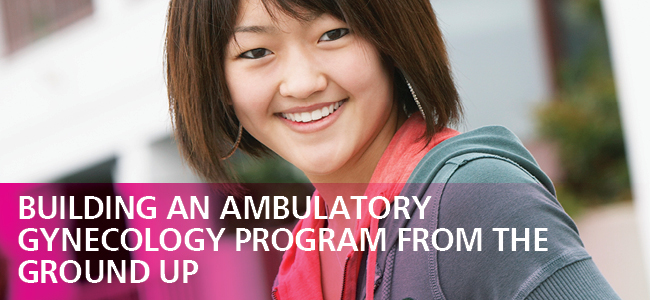Strategic Plan Area of Focus: Health for Women

Over the past 18 months, Women’s College Hospital (WCH) has re-imagined and rebuilt its Gynecology Program almost from scratch. The result is an innovative and modern program that responds to women’s health needs by bridging system gaps, building on strengths and forging collaborations with other areas of expertise within WCH.
One health system solution offered by the new Gynecology Program is the Young Women’s Gynecology Clinic, the only clinic in Canada that focuses on the specific needs of women aged 17 to 25.
“It’s a group of young women with unique healthcare characteristics that need to be addressed,” says Dr. Lisa Allen, gynecology site chief at WCH.
The clinic provides specialized care and counselling for gynecological issues within this age group, in a safe, welcoming environment with age-appropriate handouts, information and atmosphere. The clinic also bridges the transition from pediatric and adolescent gynecology to adult care – a time when patients can fall through cracks in the system.
“Some of these patients have quite complex care. One of the main things we wanted to address is that they don’t lose continuity of care when they transition to adult care,” says clinic director Dr. Yolanda Kirkham, a gynecologist with subspecialty training in pediatric and adolescent gynecology. “For example, when a patient is too old to continue being treated at Sick Kids Hospital, they can now transition to the WCH Young Women’s Gynecology Clinic, seamlessly maintaining their specialist care in an appropriate and comfortable setting.”
Over the clinic’s first year in operation, it has received excellent patient feedback. In an anonymous comment book kept by the clinic, patients expressed how they felt listened-to and well-informed, and that they had a positive experience in a safe environment.
The Gynecology Program at WCH specifically addresses areas of women’s health that are best housed in an ambulatory environment. The Ambulatory Procedures Program is designed to perform procedures under sedation, rather than general anesthetic, so recovery is easier and women can return to their activities faster. Two key procedures offered by the program are global endometrial ablation and hysteroscopic tubal occlusion.
Global endometrial ablation is an effective treatment for abnormal uterine bleeding. But unlike an alternative procedure, it doesn’t require general anesthetic, and recent Canadian guidelines recommend it. Hysteroscopic tubal occlusion is a permanent method of contraception that provides an alternative to traditional tubal ligation. Instead of performing laparoscopic surgery through the abdomen, requiring general anesthetic, hysteroscopic tubal occlusion uses a scope inserted into the uterus to place small coils into the fallopian tubes – with no surgical incisions at all.
However, neither procedure is widely offered in Toronto acute care hospitals. Those hospitals will now be able to refer patients to WCH to access these treatments.
“We’ll be a resource for the city in an area that no one else is taking on,” says Dr. Allen, adding that WCH will also serve as a teaching resource. “We’re going to have residents from the department of obstetrics and gynecology coming to Women’s College Hospital to learn how to do these procedures so that we’ll also be disseminating the knowledge and be able to expand the number of providers who will be able to do this for women in the future.”
It’s a group of young women with unique healthcare characteristics that need to be addressed.
One of the other goals of the new Gynecology Program was to identify other areas of strength within WCH, and collaborate with those leading health experts to provide unique approaches to conditions affecting women’s health.
Examples of these collaborations include the Vulvar Dermatology Clinic, which unites gynecology and dermatology to treat women with vulvar issues; the Premature Ovarian Insufficiency Clinic, a joint program of the gynecology and endocrinology departments that cares for women with a chromosomal abnormality called Turner Syndrome; and the Polycystic Ovary Syndrome Clinic that also joins gynecology with endocrinology.
“Those are a few good examples of how we tried to look at the strength around us and tried to position ourselves in working with other departments that have strong areas of need,” Dr. Allen says.
The Gynecology Program also continues its vital work in urogynecology, and in cancer prevention through its colposcopy clinic that investigates and treats early signs of cervical cancer, and its work with women at high risk of ovarian cancer.
Now that these clinical programs are underway in WCH’s new state-of-the-art building, Dr. Allen is looking ahead to her next objectives.
“Our next phase, and what we’re really invested in now, is looking at the research and teaching we can do in these areas.”
